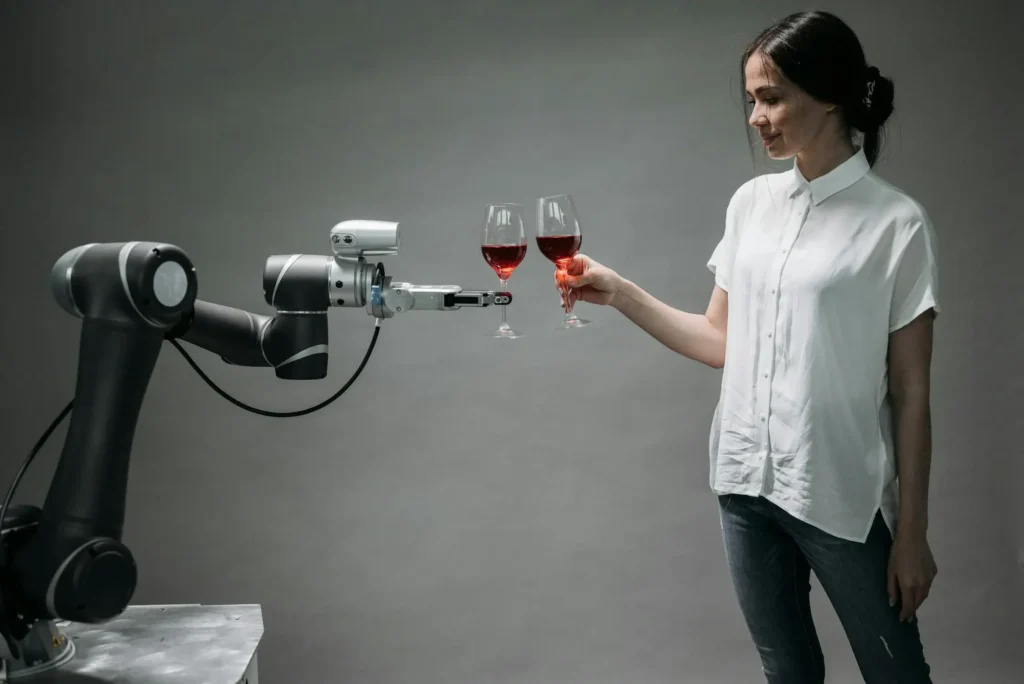Automating Operations & Logistics

Imagine a world where your sales team never sleeps, your operations run themselves, and your customers get instant, personalized responses every time. That world is no longer a distant vision. It’s here, and it’s being built by companies that are harnessing the power of AI agents to rethink how work gets done. These aren’t just bots that check boxes or send canned emails – they’re intelligent, adaptive systems that can understand context, make decisions, and act with purpose.
We’re at the beginning of a new era – one where businesses are quietly being “agentified.” Instead of relying solely on people to push processes forward, companies are embedding AI agents into the very heart of their operations. These agents are automating not just tasks, but entire workflows. From qualifying leads and running marketing campaigns to tracking inventory and handling support tickets, they’re stepping in as tireless digital teammates that work alongside humans, not against them.
Table of Contents
What’s most exciting is how accessible this transformation has become. Whether you’re a fast-growing startup or a legacy enterprise, tools like Apollo, Clay, Mutiny, Shopify Magic, and Humantic AI are making it easier than ever to plug intelligent automation into your daily operations. And this isn’t about replacing people,it’s about freeing them. When AI handles the repetitive and reactive stuff, your team gets to focus on the meaningful, strategic, and creative parts of the job.
This magazine is your guide to that shift. Through case studies, founder insights, and real-world examples, we’ll explore how today’s smartest companies are automating sales, ops, and beyond with AI. If you’re curious about the future of work and how to get ahead of it—you’re in the right place. Let’s explore what it really means to agentify your company.
Sales on Autopilot : AI Agents That Work While You Sleep
AI-driven sales automation is no longer a luxury—it’s fast becoming the default for high-velocity teams. Traditional sales processes are being replaced by intelligent agents that handle prospecting, follow-ups, and even deal progression.

Key Use Cases
CRM Automation: AI agents update contact records, enrich profiles with social and firmographic data, and flag outdated or duplicate entries, removing the biggest friction point in most sales organizations.
Lead Qualification: Intelligent scoring algorithms evaluate behavior across channels—email opens, site visits, LinkedIn activity to separate high-intent buyers from noise, prioritizing reps’ time.
Personalized Outreach & Follow-ups: Platforms like Clay and Humantic AI personalize outreach based on psychographic profiling, job titles, and company news. Messages are adapted for tone and content, boosting reply rates and reducing bounce.
Tool Stack to Watch
Apollo.io: An end-to-end sales engine, combining contact discovery, outreach automation, and performance analytics in a single interface.
Clay: A programmable prospecting engine that combines live data enrichment with workflow automation.
Humantic AI: Adds a psychological layer to outreach by building personality profiles of prospects based on publicly available digital footprints.
Founder Mention: Varun Mathur, CEO of Humantic AI, has been at the forefront of applying psychometric AI to modernize B2B selling.
Why It Matters
The AI Marketer’s Toolkit
Core Automation Areas
Content Generation: AI writing assistants handle everything from product copy to social captions, enabling teams to ideate, iterate, and publish at 10x speed.
Email Marketing: Predictive systems A/B test subject lines, determine optimal send times, and automatically adjust messaging to improve open and click rates.
Audience Targeting: AI agents analyze behavioral, demographic, and contextual signals to build high-conversion micro-segments on the fly.
Campaign Optimization: No more waiting for post-mortem analysis. Campaigns are now optimized mid-flight, reallocating budgets and testing variants in real-time based on live performance data.
Case Study: Mutiny
Mutiny enables web personalization at scale—without engineering support. Marketing teams can create dynamic landing pages tailored to industry, company size, or buyer persona, resulting in 30–50% lift in conversion.
Founder Spotlight: Jaleh Rezaei, a former Slack executive, built Mutiny to democratize growth experimentation, allowing marketers to test and deploy like product managers.
AI isn’t just helping marketers do their jobs faster, it’s reshaping how they do them. Campaigns are now co-created by humans and agents, with the AI surfacing insights, generating variants, and predicting outcomes. This convergence of creativity and computation is unlocking a new kind of performance marketing, one that’s agile, intelligent, and deeply data-driven.
AI in the Modern Buyer Journey

Strategic Applications of AI in the Buyer Journey

Product Recommendations:
AI recommendation engines analyze real-time behavioral signals, purchase history, browsing patterns, and even external data (like trending products in a region) to suggest relevant items. These systems powered by collaborative filtering and deep learning do more than upsell. They tailor the shopping experience, often resulting in larger basket sizes, higher repeat purchases, and stronger brand affinity. Amazon and Netflix have long set the gold standard here, but platforms like Shopify and BigCommerce now bring similar capabilities to small and mid-sized brands.Customer Engagement Agents:
Conversational AI has evolved from basic chatbots to sophisticated, multilingual digital assistants that can manage everything from product education to refunds. These agents leverage NLP (Natural Language Processing) to understand intent, respond empathetically, and route complex issues to humans when needed. Whether embedded in a website, mobile app, or messaging platform like WhatsApp, they help users self-navigate even the most complex purchase decisions. Importantly, they offer consistency in delivering the same quality of service at 2 AM as at noon.Conversion Intelligence:
AI doesn’t just engage; it anticipates. By tracking micro-signals like scroll depth, hover time, and hesitation before cart abandonment, AI-powered agents can trigger the right prompt at the right moment. These nudges, whether a limited-time offer, a reminder of an unused discount code, or a reassurance about free returns have been shown to dramatically lift conversion rates. Tools like Insider, Optimonk, and ConvertFlow enable marketers to orchestrate these experiences without code.
Use Case: Shopify Magic
Shopify Magic represents a leap forward in democratizing AI for e-commerce. This AI suite, built directly into the Shopify platform, equips merchants with a suite of intelligent tools, many of which would previously have required an entire growth team or technical staff. Sellers can auto-generate high-converting product descriptions, resolve customer queries through AI chat, and even get guidance on pricing, SEO, and inventory optimization.
From Solo Hustlers to Scalable Enterprises: How Shopify Magic & Sidekick Are Redefining Ecommerce
Shopify Magic and Sidekick do much more than just write SEO-friendly product descriptions. Together, they signal a major shift in how independent merchants can operate with the efficiency and intelligence of much larger businesses—without the overhead.
SEO-Optimized Content Without the Grind
Shopify Magic helps merchants create high-quality product titles, descriptions, and metadata that are tailored to tone, audience, and search behavior. Instead of manually writing content for each product, business owners can focus on strategy while the platform handles the optimization in the background.
Customer Service That Feels Personal
With Sidekick, merchants can now automate responses to customer questions by drawing on existing FAQs, store policies, and even past customer behavior. This results in quicker, more relevant answers offering a level of service that feels personal, even when it’s powered by AI.
Smarter Store Management at Your Fingertips
Sidekick isn’t just about writing or support. It acts as an intelligent assistant across store operations flagging unusual sales trends, helping manage inventory, optimizing pricing, or assisting with marketing campaigns. It brings decision-making support that would otherwise require a team of experts.
Whether you’re running a one-person shop or scaling into multiple sales channels, Shopify’s AI tools make it possible to move faster, work smarter, and deliver a better experience without growing your headcount.
Market Insight: From Sales Support to Sales Leadership

Takeaway: Automation as Competitive Strategy

The age of brute-force selling is over. In today’s hyper-competitive, fast-paced markets, companies aren’t winning by hiring more people, they’re winning by hiring smarter systems. Sales and marketing teams that once relied on volume and manual hustle are now being outpaced by those that have embedded intelligent automation into their daily operations. AI agents are emerging as the backbone of modern revenue engines, bringing with them not just efficiency but strategic advantages.
Agentification, when executed well, goes beyond automating tasks. It introduces a new layer of capability: systems that observe, learn, and evolve. A sales agent that follows up based on tone analysis. A marketing engine that writes and tests 20 ad variations in a day. A chatbot that doesn’t just answer questions—but detects buyer hesitation and intervenes with a tailored offer. These aren’t futuristic ideas—they’re happening today in companies bold enough to give AI a seat at the table.
What makes this transformation particularly powerful is its compounding effect. The more data these systems gather, the better they perform. Over time, they don’t just streamline operations—they uncover insights, reveal patterns, and suggest new strategies that humans alone might miss. In essence, AI agents become growth multipliers: amplifying the impact of every human they support and every decision they inform.
Looking ahead, the winners in sales and marketing won’t be those with the largest teams but those with the most intelligent, adaptive, and scalable systems. Companies that invest early in AI-driven automation are laying the groundwork not just for short-term gains, but for long-term dominance. They’re not just working faster; they’re working smarter, anticipating change, and leading markets that others are still trying to understand. In a world where every second counts and every interaction matters, automation is no longer just a tool, it’s a competitive strategy.
As the June edition of HonestAI makes clear, AI can be a force for good — or a source of harm. Whether it’s shaping what we watch or guiding life-changing medical decisions, AI must be designed with transparency, ethical integrity, and accountability at the forefront.
Contributor:

Nishkam Batta
Editor-in-Chief – HonestAI Magazine
AI consultant – GrayCyan AI Solutions
Nish specializes in helping mid-size American and Canadian companies assess AI gaps and build AI strategies to help accelerate AI adoption. He also helps developing custom AI solutions and models at GrayCyan. Nish runs a program for founders to validate their App ideas and go from concept to buzz-worthy launches with traction, reach, and ROI.
Contributor:

Nishkam Batta
Editor-in-Chief - HonestAI Magazine
AI consultant - GrayCyan AI Solutions
Nish specializes in helping mid-size American and Canadian companies assess AI gaps and build AI strategies to help accelerate AI adoption. He also helps developing custom AI solutions and models at GrayCyan. Nish runs a program for founders to validate their App ideas and go from concept to buzz-worthy launches with traction, reach, and ROI.


